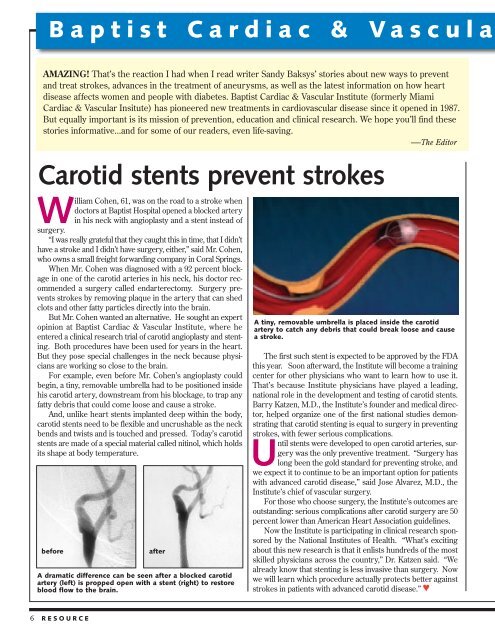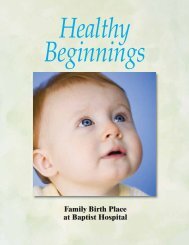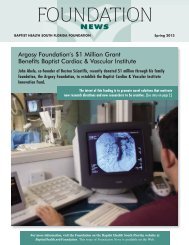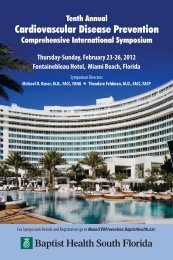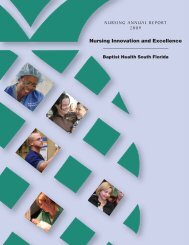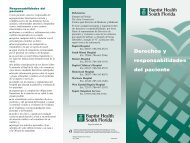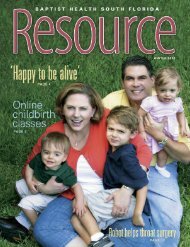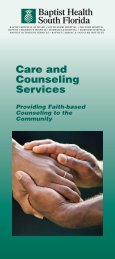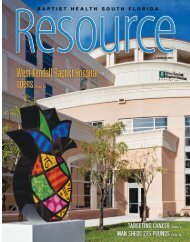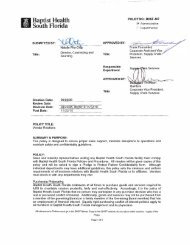Resource: Spring 2004 - Baptist Health South Florida
Resource: Spring 2004 - Baptist Health South Florida
Resource: Spring 2004 - Baptist Health South Florida
- TAGS
- baptist
- baptisthealth.net
Create successful ePaper yourself
Turn your PDF publications into a flip-book with our unique Google optimized e-Paper software.
<strong>Baptist</strong> Cardiac & Vascula<br />
AMAZING! That’s the reaction I had when I read writer Sandy Baksys’ stories about new ways to prevent<br />
and treat strokes, advances in the treatment of aneurysms, as well as the latest information on how heart<br />
disease affects women and people with diabetes. <strong>Baptist</strong> Cardiac & Vascular Institute (formerly Miami<br />
Cardiac & Vascular Insitute) has pioneered new treatments in cardiovascular disease since it opened in 1987.<br />
But equally important is its mission of prevention, education and clinical research. We hope you’ll find these<br />
stories informative...and for some of our readers, even life-saving.<br />
—-The Editor<br />
Carotid stents prevent strokes<br />
William Cohen, 61, was on the road to a stroke when<br />
doctors at <strong>Baptist</strong> Hospital opened a blocked artery<br />
in his neck with angioplasty and a stent instead of<br />
surgery.<br />
“I was really grateful that they caught this in time, that I didn’t<br />
have a stroke and I didn’t have surgery, either,” said Mr. Cohen,<br />
who owns a small freight forwarding company in Coral <strong>Spring</strong>s.<br />
When Mr. Cohen was diagnosed with a 92 percent blockage<br />
in one of the carotid arteries in his neck, his doctor recommended<br />
a surgery called endarterectomy. Surgery prevents<br />
strokes by removing plaque in the artery that can shed<br />
clots and other fatty particles directly into the brain.<br />
But Mr. Cohen wanted an alternative. He sought an expert<br />
opinion at <strong>Baptist</strong> Cardiac & Vascular Institute, where he<br />
entered a clinical research trial of carotid angioplasty and stenting.<br />
Both procedures have been used for years in the heart.<br />
But they pose special challenges in the neck because physicians<br />
are working so close to the brain.<br />
For example, even before Mr. Cohen’s angioplasty could<br />
begin, a tiny, removable umbrella had to be positioned inside<br />
his carotid artery, downstream from his blockage, to trap any<br />
fatty debris that could come loose and cause a stroke.<br />
And, unlike heart stents implanted deep within the body,<br />
carotid stents need to be flexible and uncrushable as the neck<br />
bends and twists and is touched and pressed. Today’s carotid<br />
stents are made of a special material called nitinol, which holds<br />
its shape at body temperature.<br />
before after<br />
A dramatic difference can be seen after a blocked carotid<br />
artery (left) is propped open with a stent (right) to restore<br />
blood flow to the brain.<br />
6 RESOURCE<br />
A tiny, removable umbrella is placed inside the carotid<br />
artery to catch any debris that could break loose and cause<br />
a stroke.<br />
The first such stent is expected to be approved by the FDA<br />
this year. Soon afterward, the Institute will become a training<br />
center for other physicians who want to learn how to use it.<br />
That’s because Institute physicians have played a leading,<br />
national role in the development and testing of carotid stents.<br />
Barry Katzen, M.D., the Institute’s founder and medical director,<br />
helped organize one of the first national studies demonstrating<br />
that carotid stenting is equal to surgery in preventing<br />
strokes, with fewer serious complications.<br />
Until stents were developed to open carotid arteries, surgery<br />
was the only preventive treatment. “Surgery has<br />
long been the gold standard for preventing stroke, and<br />
we expect it to continue to be an important option for patients<br />
with advanced carotid disease,” said Jose Alvarez, M.D., the<br />
Institute’s chief of vascular surgery.<br />
For those who choose surgery, the Institute’s outcomes are<br />
outstanding: serious complications after carotid surgery are 50<br />
percent lower than American Heart Association guidelines.<br />
Now the Institute is participating in clinical research sponsored<br />
by the National Institutes of <strong>Health</strong>. “What’s exciting<br />
about this new research is that it enlists hundreds of the most<br />
skilled physicians across the country,” Dr. Katzen said. “We<br />
already know that stenting is less invasive than surgery. Now<br />
we will learn which procedure actually protects better against<br />
strokes in patients with advanced carotid disease.” ♥


